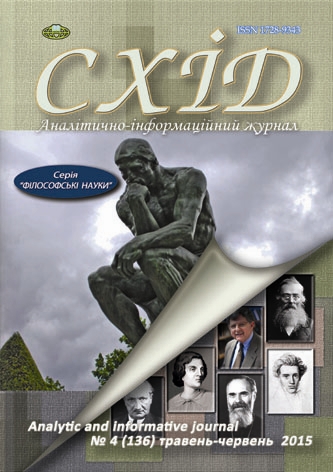Interpretations of the concept of faith in contemporary Protestant theology
DOI:
https://doi.org/10.21847/1728-9343.2015.4(136).48357Keywords:
contemporary theology, faith, kerygma, narrativeAbstract
The paper looks into the main logical interpretations of the phenomenon of faith in contemporary Protestant theology. The research methodology is based on the paradigmal analysis theory of theological knowledge of G. Kng and H. U. von Balthasar, which present-day co-developers are T. Rowland, F. Kerr, A. Kolodnyi, Y. Chernomorets, G. Khrystokin et al. The author draws a conclusion that contemporary Protestant theology interprets faith in a non-metaphysical and personalistic way. Thus, K. Bart perceives faith as a new way of living of an individual, that real mode of existence which existentialists distinguished from usual existence. That way of living becomes possible after an individual accepts his or her own condemnation acknowledged owing to propagation of Christian kerygma. Protestant theology of the late 20th-early 21st centuries interprets faith as commitment to the Community of God and acceptance of the biblical narrative (N. T. Wright). An alternative concept is interpretation of faith as intuitive knowledge (J. Milbank). In general, Protestant theologians describe faith as an occurrence which takes place during communication with God and as such, faith is not a result of activities of human abilities but a genuine gift from God, which the possessor can only accept and affirm.
Downloads
References
Küng Hans (2000), Great Christian Thinkers (translated), Aleteyya, St. Petreburge, 442 p. (rus).
Balthasar Hans Urs von (1997), Only love is worthy of faith (translated), Istyna i Zhyzn, Moscow, 124 p. (rus).
Rowland T. (2003), Culture and the Thomist Tradition: After Vatican II. Routledge, 208 p. (engl).
Rowland T. (2008), Ratzinger’s Faith. The theology of pope Benedict XVI. Oxford University Press, Oxford, 214 p. (engl).
Kerr F. (2003), After Aquinas: versions of Thomism, Blackwell Publishers, Oxford, 254 p. (engl).
Kolodnyi A. M. (2005), Christianity is the postmodern era, Ukrainske relihiyeznavstvo, № 3 (35), pр. 5-33 (ukr).
Chornomorets Yu. P. (2013), Filosofska dumka-Sententiae: Special Issue, № 3, VDTU, Vinnytsia, pp. 74-88 (ukr).
Khrystokin H. V. (2007), New patristic a paradigm of modern Orthodox theology in: Ukrainske relihiyeznavstvo, № 43, pp. 61-69 (ukr).
Levchenko T.H. (2011), Filosofska dumka-Sententiae: Special Issue, № 2, VDTU, Vinnytsia, pp. 119-127 (ukr).
Hromádka Josef Lukl (1993), Turning point in Protestant theology (translated), Prohress, Kultura, Moscow, 192 p. (rus).
Barth Karl (2005), The Epistle to the Romans (translated), BBY, Moscow 580 p. (rus).
Barth Karl (2006), Evangelical Theology: An Introduction (translated), Tsentr «Narnyya», Moscow, 192 p. (rus).
Bultman R. (1994), Sotsyalno-politicheskoye izmerenye khristianstva, available at: http://www.gumer.info/bogoslov_Buks/bibliologia/Article/bultm.php (rus).
Wright N. T. (2007), The authority of Scripture in the power of God (translated) Kollokvium, Cherkassy, 152 p. (rus).
Wright N. T. (2013), The New Testament and the People of God Kollokvium, Cherkassy, 704 p. (rus).
Mylbank Dzh. (2013), Filosofska dumka-Sententiae: Special Issue, № 3, VDTU, Vinnytsia, pp. 108-120 (ukr).
Downloads
Published
How to Cite
Issue
Section
License
Copyright (c) 2015 Tetiana Levchenko

This work is licensed under a Creative Commons Attribution-NonCommercial-NoDerivatives 4.0 International License.
1. Authors bear responsibility for the accuracy of facts, quotations, numbers and names used.
2. Manuscripts are not sent back.
3. The publisher does not always agree with the authors' opinion.
4. The authors reserve the right to authorship of the work and pass the first publication right of this work to the journal under the terms of a Creative Commons Attribution-NonCommercial-NoDerivatives 4.0 International License. This license allows others to distribute (copy) the published work for non-commercial purposes, provided there is mandatory attribution to its authors and a link to the first publication in our journal.
5. The authors have the right to conclude separate supplement agreements that relate to non-exclusive work distribution in the form in which it has been published by the journal (for example, to upload the work to the online storage of the journal or publish it as part of a monograph), provided that the reference to the first publication of the work in this journal is included.

